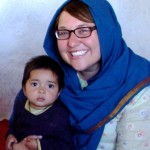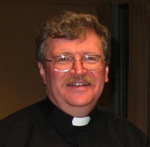Yesterday evening I had the pleasure of attending a reception and photography exhibit at LUMA – the Loyola University Museum of Art. The photographer Noah Addis captured positive images of individuals moving from homelessness to housing. Sponsored by Loyola’s Center for Urban Research and Learning (CURL) and the Chicago Alliance to End Homelessness among others, the exhibit confronts the dominant stereotypes that homeless individuals are helpless street beggars or that organizations serving them are just providing handouts without addressing long-term solutions. Many of the subjects were present at the lecture, and they were eager to tell their stories. The exhibit will be at LUMA until January 15th. It is free for Loyola students. LUMA is located in Lewis Towers, entrance across the street from the Old Water Tower on the east side of the building.
Search
Recent Post
- A conversation with Jenni Dressler ’22 IPS alumna
- September 2023
- Dr. William Schmidt Celebrates 30 years with IPS
- The time is now – to discern, reflect, comprehend and act
- Meet Julie
Categories
- Art & Religion
- Business & Religion
- Catholic News
- Catholic Social Thought
- Chaplaincy
- Early Christianity
- Environment
- Graduation
- Interfaith Dialgoue
- IPS
- IPS Alumni
- IPS Events
- IPS Photos
- IPS Student Orientation
- IPS Students
- IPS Videos
- Jesuit University
- Karl Rahner
- Loyola University
- Old Testament
- Parable
- Pastoral Counseling
- Pope Francis
- Refugee Crisis
- Service
- Social Justice & Community Development
- Uncategorized
Archives
- August 2024
- September 2023
- April 2023
- February 2023
- August 2022
- May 2022
- March 2022
- February 2022
- October 2021
- May 2021
- July 2020
- June 2020
- May 2020
- March 2020
- February 2020
- January 2020
- December 2019
- November 2019
- October 2019
- September 2019
- July 2019
- June 2019
- April 2019
- March 2019
- February 2019
- January 2019
- December 2018
- November 2018
- October 2018
- September 2018
- August 2018
- July 2018
- May 2018
- April 2018
- March 2018
- February 2018
- January 2018
- December 2017
- November 2017
- October 2017
- September 2017
- August 2017
- July 2017
- April 2017
- March 2017
- February 2017
- January 2017
- December 2016
- November 2016
- October 2016
- September 2016
- July 2016
- May 2016
- April 2016
- March 2016
- February 2016
- December 2015
- November 2015
- October 2015
- September 2015
- August 2015
- July 2015
- June 2015
- May 2015
- April 2015
- March 2015
- February 2015
- January 2015
- December 2014
- November 2014
- October 2014
- September 2014
- August 2014
- June 2014
- May 2014
- April 2014
- March 2014
- February 2014
- December 2013
- November 2013
- October 2013
- September 2013
- August 2013
- July 2013
- May 2013
- April 2013
- March 2013
- February 2013
- January 2013
- December 2012
- November 2012
- October 2012
- September 2012
- August 2012
- July 2012
- June 2012
- May 2012
- April 2012
- March 2012
- February 2012
- January 2012
- December 2011
- November 2011
- October 2011
- September 2011
- August 2011
- July 2011
- March 2011
- February 2011
- January 2011
- December 2010
- November 2010
- October 2010
- September 2010
- August 2010
- July 2010


